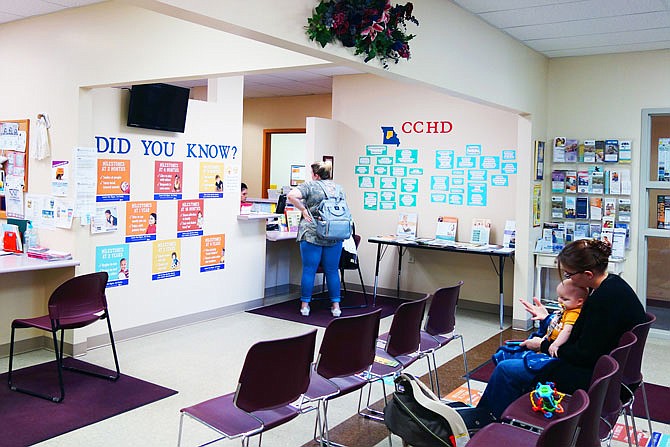After two years of planning, the Callaway County Health Department began screening WIC participants this week for postpartum depression.
"It's been a long two years - it's hard to get your ducks in a row," CCHD Director Sharon Lynch said. "We're going to start with moms who've just had babies and fathers if they'd like to be screened. Eventually, there's some research that says (the depression) can start before birth, so we could look at this in future."
When new moms come in for a WIC appointment, they'll have the option of going through a brief question-and-answer-style screening. If they're judged to be at risk or are showing symptoms for postpartum depression, CCHD will refer them to a local mental health professional. The screenings are voluntary, free and available even to parents not enrolled in WIC.
"We're not diagnosing anything; all we're doing is screening," Lynch said.
Most people know about the "baby blues." Postpartum depression is more serious, according to the Mayo Clinic. The baby blues resolves after a week or two and involves symptoms such as anxiety, the occasional crying jag, feeling overwhelmed and trouble sleeping. Postpartum depression lasts longer, and the symptoms are more intense: hopelessness, anxiety and panic attacks, insomnia, difficulty bonding with your baby, overwhelming fatigue and more.
Parents of any gender may experience postpartum depression, and a history of depression or financial struggles are risk factors.
Up to one in five mothers develops postpartum depression, Lynch said.
In one or two cases out of every 1,000 deliveries, a mother may develop postpartum psychosis, which may involve paranoia, hallucinations and attempts to harm oneself or one's baby. The psychosis usually develops within the first couple of weeks after birth.
A 2017 survey conducted by Central Missouri Community Action in Fulton found a major need for maternal mental health resources in the community. That's when Callaway Resource Network - a coalition of local nonprofits - vowed to make maternal mental health a priority. They've done that through screenings of a documentary about postpartum depression and working with the CCHD and CMCA to bring screenings to the county.
Previous areas of focus for the group have included the HiSET and dental health.
To pursue the project, CCHD applied for the Maternal and Child Health Services Block Grant, a three-year federal grant administered through the state.
"Maternal mental health wasn't one of the main purposes for the grant so we hired a company to gather information and prove there was a need for that," Lynch said. "Boone and Greene counties are the only other counties that have been given a three-year MCH for maternal mental health."
The first year of the grant was a planning phase, spent surveying CCHD's clients, developing a list of referral partners, choosing a screening method and training staff. Special protocols are in place to deal with cases of potential postpartum psychosis. Lynch said they're planning more training for staff in the future.
"We've standardized it so everyone got same experience," Lynch said. "We're doing due diligence. The policies are fluid and we'll adjust them as needed, but we've got to start somewhere and this is where we're starting for today."
CCHD plans to use the Edinburgh Postnatal Depression Scale, a questionnaire that asks new parents 10 questions, such as how much time they spend happy and whether they blame themselves unfairly when things go wrong. At the end, the answers are scored, and the score determines whether the person needs a referral.
The CCHD will follow up in a week or two for those who receive a referral or at the next WIC visit for those who don't.
Referral partners include Community Health Central of Central Missouri, Great Circle, the Center for Women's Ministries and the Arthur Center, among others.
CCHD will collect statistics (with no personal information attached) to help evaluate the program's effectiveness.
"Our hope is that if we get this system develop and it works, we can share it with other health departments," Lynch said.
CMCA and other nonprofits have voiced interest in starting their own screening programs, she added.
"There's a lot of movement in that direction where there wasn't before," she said. "So much of public health is, we're not going to get results today or tomorrow, but the children of mothers we're able to help will have better experience in life."

